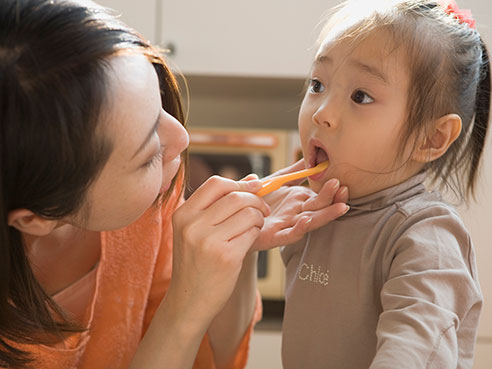 Parents play the key role in helping their children to develop a proper oral hygiene routine, says University of Alabama at Birmingham pediatric dentist Stephen Mitchell, DMD, and the beginning of the school year is always a great time to begin or reinforce correct oral care techniques.
Parents play the key role in helping their children to develop a proper oral hygiene routine, says University of Alabama at Birmingham pediatric dentist Stephen Mitchell, DMD, and the beginning of the school year is always a great time to begin or reinforce correct oral care techniques.
“This is the time of year when many parents and children begin daily routines, and it’s a good time for children to get into the habit of brushing their teeth in the morning and at night before they go to bed if they don’t do so already,” said Mitchell, director of Predoctoral Pediatric Dentistry in UAB’s School of Dentistry. “Help your kids develop the habit of doing their best brushing of the day just before bed so they sleep with clean mouths. Parents really should actively lead and supervise their children’s toothbrushing for the first 12 years or so of life, until their motor and mental functions allow them to routinely perform a proper toothbrushing technique on their own.”
Sending children back to school also creates oral health challenges, including lunch habits, protecting children who play sports and how often to floss.
Mitchell says parents should take charge in each of these areas.
Lunch habits: “Chocolate milk and fruit juices sound and maybe even taste great, but look at how many calories are packed into the bottle,” Mitchell said. “Consider flavored waters and 2 percent or skim milk instead.”
Sports: Football is not the only sport in which children should wear mouth guards. “Soccer, karate, basketball and lacrosse also are high-impact sports,” Mitchell said. “Don’t forget to protect kids playing these sports too.”
| “Three brushings a day helps with fresh breath, but does not do more for tooth health than two good brushings. The only exception would be if your child has braces. Children with braces that tend to collect food may want to have that third brushing.” |
When to brush and floss: Mitchell says, if your children are brushing well before school and before bed, do not feel pressured to make them take a brush to school for after lunch. “Three brushings a day helps with fresh breath, but does not do more for tooth health than two good brushings,” Mitchell said. “The only exception would be if your child has braces. Children with braces that tend to collect food may want to have that third brushing.” Mitchell says one good flossing per day should be plenty. “If your child’s teeth do not touch a neighboring tooth, the toothbrush will clean them very well; but if they touch their neighbor, you will need to floss,” he said. “At night before bed is generally best.”
Mitchell says teachers and administrators also have an opportunity to reinforce positive oral health habits by teaching good nutrition.
Healthy eating that avoids high-processed sugars benefits teeth and the whole body.
“Schools with access to gardens that can teach how to raise fresh fruits and vegetables will help children learn how to feed themselves without relying on those cheap processed foods,” Mitchell said. “Add in a little about brushing and flossing if there is time, but focus more on total nutrition.”
Mitchell also says a teacher who identifies a child with tooth decay or other oral deficiencies should encourage the family to get help; it will very likely improve the child’s classroom learning and benefit his or her health.
“Studies clearly show that children with active dental pain do not learn well in the classroom,” Mitchell said. “And, honestly, who could focus and pay attention with a throbbing tooth?”